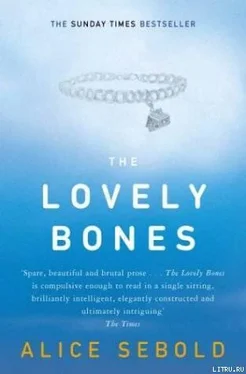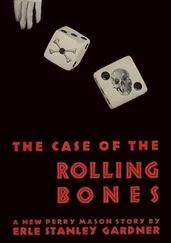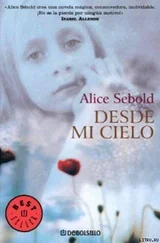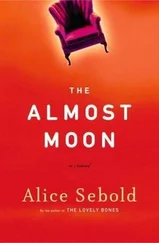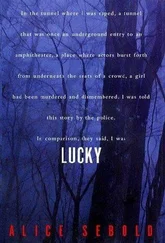“Let’s go upstairs,” he said.
“I feel like I’m in a cave,” said Lindsey as they climbed the stairs. “It’s so quiet in here you can barely hear the rain.”
Samuel bounced the soft side of his fist off the plaster as he went. “You could wall someone into this place.”
And suddenly it was one of those awkward moments that they had learned to let pass and I lived to anticipate. It begged a central question. Where was I? Would I be mentioned? Brought up and discussed? Usually now the answer was a disappointing no. It was no longer a Susie-fest on Earth.
But something about the house and the night – markers like graduations and birthdays always meant that I was more alive, higher up in the register of thoughts – made Lindsey dwell on me more in that moment than she normally might. Still, she didn’t mention it. She remembered the heady feeling she had had in Mr. Harvey’s house and that she had often felt since – that I was with her somehow, in her thoughts and limbs – moving with her like a twin.
At the top of the stairs they found the entrance to the room they had stared up at.
“I want this house,” Samuel said.
“What?”
“This house needs me, I can feel it.”
“Maybe you should wait until the sun comes out to decide,” she said.
“It’s the most beautiful thing I’ve ever seen,” he said.
“Samuel Heckler,” my sister said, “fixer of broken things.”
“One to talk,” he said.
They stood for a moment in silence and smelled the damp air coming through the chimney and flooding the room. Even with the sound of rain, Lindsey still felt hidden away, tucked safely in an outside corner of the world with the one person she loved more than anyone else.
She took his hand, and I traveled with them up to the doorway of a small room at the very front. It jutted out over what would be the entrance hall of the floor below and was octagonal in shape.
“Oriels,” Samuel said. “The windows” – he turned to Lindsey – “when they’re built out like that, like a tiny room, that’s called an oriel.”
“Do they turn you on?” Lindsey asked, smiling.
I left them in the rain and darkness. I wondered if Lindsey noticed that when she and Samuel began to unzip their leathers the lightning stopped and the rumble in the throat of God – that scary thunder – ceased.
In his den, my father reached out to hold the snow globe in his hand. The cold glass against his fingers comforted him, and he shook it to watch the penguin disappear and then slowly be uncovered by the gently falling snow.
Hal had made it back from the graduation ceremonies on his motorcycle but instead of calming my father – providing some assurance that if one motorcycle could maneuver the storm and deliver its rider safe to his door, another one could too – it seemed to stack the probabilities in the reverse in his mind.
He had taken what could be called a painful delight in Lindsey’s graduation ceremony. Buckley had sat beside him, dutifully prompting him when to smile and react. He often knew when, but his synapses were never as quick now as normal people’s – or at least that was how he explained it to himself. It was like reaction time in the insurance claims he reviewed. There was an average number of seconds for most people between when they saw something coming – another car, a rock rolling down an embankment – and when they reacted. My father’s response times were slower than most, as if he moved in a world where a crushing inevitability had robbed him of any hope of accurate perception.
Buckley tapped on the half-open door of my father’s den.
“Come in,” he said.
“They’ll be okay, Dad.” At twelve, my brother had become serious and considerate. Even if he didn’t pay for the food or cook the meals, he managed the house.
“You looked good in your suit, son,” my father said.
“Thanks.” This mattered to my brother. He had wanted to make my father proud and had taken time with his appearance, even asking Grandma Lynn that morning to help trim the bangs that fell in his eyes. My brother was in the most awkward stage of adolescence – not boy, not man. Most days he hid his body in big T-shirts and sloppy jeans, but he had liked wearing the suit that day. “Hal and Grandma are waiting for us downstairs,” he said.
“I’ll be down in a minute.”
Buckley closed the door all the way this time, letting the latch snap into place.
That fall my father had developed the last roll of film that I’d kept in my closet in my “rolls to hold back” box, and now, as he often did when he begged just a minute before dinner or saw something on TV or read an article in the paper that made his heart ache, he drew back his desk drawer and gingerly lifted the photos in his hand.
He had lectured me repeatedly that what I called my “artistic shots” were foolhardy, but the best portrait he ever had was one I took of him at an angle so his face filled the three-by-three square when you held it so it was a diamond.
I must have been listening to his hints on camera angles and composition when I took the pictures he held now. He had had no idea what order the rolls were in or what they were of when he had them developed. There were an inordinate number of photos of Holiday, and many a shot of my feet or the grass. Gray balls of blurs in the air which were birds, and a grainy attempt at a sunset over the pussy-willow tree. But at some point I had decided to take portraits of my mother. When he’d picked the roll up at the photo lab my father sat in the car staring at photos of a woman he felt he barely knew anymore.
Since then he had taken these photos out too many times to count, but each time he looked into the face of this woman he had felt something growing inside him. It took him a long time to realize what it was. Only recently had his wounded synapses allowed him to name it. He had been falling in love all over again.
He didn’t understand how two people who were married, who saw each other every day, could forget what each other looked like, but if he had had to name what had happened – this was it. And the last two photos in the roll provided the key. He had come home from work – I remember trying to keep my mother’s attention as Holiday barked when he heard the car pull into the garage.
“He’ll come out,” I said. “Stay still.” And she did. Part of what I loved about photography was the power it gave me over the people on the other side of the camera, even my own parents.
Out of the corner of my eye I saw my father walk through the side door into the yard. He carried his slim briefcase, which, years before, Lindsey and I had heatedly investigated only to find very little of interest to us. As he set it down I snapped the last solitary photo of my mother. Already her eyes had begun to seem distracted and anxious, diving under and up into a mask somehow. In the next photo, the mask was almost, but not quite, in place and the final photo, where my father was leaning slightly down to give her a kiss on the cheek – there it was.
“Did I do that to you?” he asked her image as he stared at the pictures of my mother, lined up in a row. “How did that happen?”
“The lightning stopped,” my sister said. The moisture of the rain on her skin had been replaced by sweat.
“I love you,” Samuel said.
“I know.”
“No, I mean I love you, and I want to marry you, and I want to live in this house!”
“What?”
“That hideous, hideous college shit is over!” Samuel screamed. The small room absorbed his voice, barely bouncing back an echo from its thick walls.
“Not for me, it isn’t,” my sister said.
Samuel got up off the floor, where he had been lying beside my sister, and came to his knees in front of her. “Marry me.”
Читать дальше
